Jerome Parisse's Blog, page 10
June 12, 2011
The Way Back
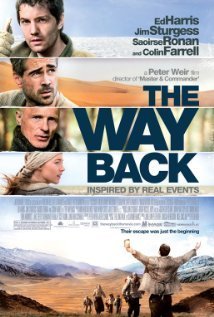 I saw The Way Back on my flight to London last week and really enjoyed it. It is the story of a group of men who escape a Siberian gulag in 1941 and reach India after walking 4000 miles. As you can imagine, their escape is fraught with dangers, mostly from the inhospitable environment: they escape Siberia in the middle of winter and must cross Mongolia and the Gobi desert, as well as part of the Himalayas. It is a story of friendship and courage, tender at times, hard, sad, and beautiful. The acting is very good and includes . It was directed by and was released in 2010.
I saw The Way Back on my flight to London last week and really enjoyed it. It is the story of a group of men who escape a Siberian gulag in 1941 and reach India after walking 4000 miles. As you can imagine, their escape is fraught with dangers, mostly from the inhospitable environment: they escape Siberia in the middle of winter and must cross Mongolia and the Gobi desert, as well as part of the Himalayas. It is a story of friendship and courage, tender at times, hard, sad, and beautiful. The acting is very good and includes . It was directed by and was released in 2010.









June 11, 2011
The Rite
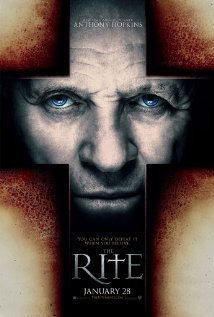 The Rite is a 2011 movie directed by and starring . In this film the son of a funeral director joins a seminary, only to give it up later because of a strong lack of faith. However, his mentor, who still believes in him, urges him to go to Italy to take an exorcism course, hoping that it would strengthen his faith in Christianity. There he meets an exorcist, Father Lucas, who will open his eyes to the existence of the Devil and restore his faith. Nothing new sub sole. And I was a little disappointed by the movie as a consequence. In spite of a lot of body convulsions and screams, the movie fails at scaring the audience, and without any new, imaginative take on exorcism, it simply fails.
The Rite is a 2011 movie directed by and starring . In this film the son of a funeral director joins a seminary, only to give it up later because of a strong lack of faith. However, his mentor, who still believes in him, urges him to go to Italy to take an exorcism course, hoping that it would strengthen his faith in Christianity. There he meets an exorcist, Father Lucas, who will open his eyes to the existence of the Devil and restore his faith. Nothing new sub sole. And I was a little disappointed by the movie as a consequence. In spite of a lot of body convulsions and screams, the movie fails at scaring the audience, and without any new, imaginative take on exorcism, it simply fails.









June 10, 2011
Little White Lies
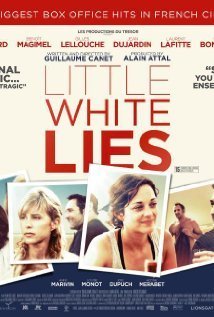 I recently asked a friend of mine if he wanted to go and see a French movie, and his answer was, "I'd love to, but to be honest I am not very keen on French movies. They have no plot." I went to see the movie by myself, and indeed it had no plot. I thought about it hard and came to the conclusion that my friend was right, most French movies have no plot. Movies are a little bit like books: some of them are plot-driven (think Harlan Coben), others are character-driven (think Jodi Picoult). The books I like usually have a strong plot ( I mean by that, that things happen) but also strong characters who change over the course of the book. As far as movies are concerned, it seems that some countries are better at one style, for example American movies always have strong plots while French movies have strong characters and unfortunately very weak plots. In French movies, a group of people often spend their time smoking and drinking, hurling insults at each other, then falling into each other's arms, sleeping with each other, or simply ignoring one another. Little White Lies is definitely character-driven and the only thing that happens, happens in the first thirty seconds. After that, it's all about people (friends in this case) yelling at each other or laughing together. The movie is not that bad, but don't expect anything unusual. It was written and directed by , whose work I usually enjoy. Maybe next time…
I recently asked a friend of mine if he wanted to go and see a French movie, and his answer was, "I'd love to, but to be honest I am not very keen on French movies. They have no plot." I went to see the movie by myself, and indeed it had no plot. I thought about it hard and came to the conclusion that my friend was right, most French movies have no plot. Movies are a little bit like books: some of them are plot-driven (think Harlan Coben), others are character-driven (think Jodi Picoult). The books I like usually have a strong plot ( I mean by that, that things happen) but also strong characters who change over the course of the book. As far as movies are concerned, it seems that some countries are better at one style, for example American movies always have strong plots while French movies have strong characters and unfortunately very weak plots. In French movies, a group of people often spend their time smoking and drinking, hurling insults at each other, then falling into each other's arms, sleeping with each other, or simply ignoring one another. Little White Lies is definitely character-driven and the only thing that happens, happens in the first thirty seconds. After that, it's all about people (friends in this case) yelling at each other or laughing together. The movie is not that bad, but don't expect anything unusual. It was written and directed by , whose work I usually enjoy. Maybe next time…









June 9, 2011
The Emerald Atlas, by John Stephens
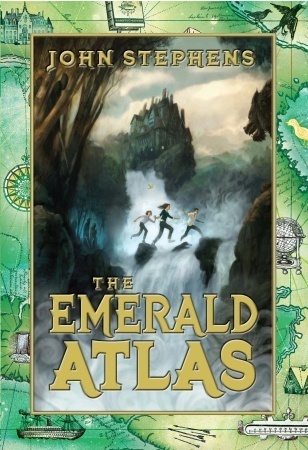 Kate, Michael, and Emma are three siblings whose parents disappeared a long time ago, leading them to move from orphanage to orphanage for many years. One day though they are driven to a totally new kind of orphanage, in a sad and unusual location, and this is where the adventure begins. They discover a book which they can use to move through time, and in the process they find themselves involved in a story they wish they had nothing to do with. But their fate is nothing less than to save the world, and like any good heroes, they embrace it. They meet dwarves and monsters in the process, make friends and enemies, and discover what happened to their parents. The Emerald Atlas is a young adult fantasy book. John Stephens writes well and the reading is therefore smooth and enjoyable. The story is not very innovative; in fact, at times you find yourself thinking, 'I've read this before.' But it works. I especially liked his characterisation, in particular young Emma, who is feisty but adorable, and her brother Michael, who is fascinated by dwarves. Kate's character lacks a little depth but is okay. The villains are not bad either. The only real flaw in the book for me is that its plot is partly based on time travel, and like many other time-travel based stories, books and movies alike, it presents difficulties. A book that makes you think is a good book, but you shouldn't have to stop and ponder about what you've read for too long to understand it. This is unfortunately too often the case for time travel. This book is no different. I read it, but I'd find it hard to explain in detail what happened at which time and how it has affected the past, the present and the future. And the proof is that towards the end of the story, one of the children (who, I should add, spend the book moving through time!) feels the need to ask Dr Pym (a wizard and some kind of mentor) what really happened as far as time and time-linked changes are concerned… It says it all. To finish on this topic, I also find that time travel is an easy device to pull heroes out of trouble. For example, they are going to die, there are hundreds of monsters pursuing them, they are under water with no air etc (you get my gist) but with a change somewhere in the past, poof!, they escape the inevitable and are sound and safe. In spite of this small flaw, The Emerald Atlas is a very pleasant read. It is the first installment in a trilogy called The Books of Beginning.
Kate, Michael, and Emma are three siblings whose parents disappeared a long time ago, leading them to move from orphanage to orphanage for many years. One day though they are driven to a totally new kind of orphanage, in a sad and unusual location, and this is where the adventure begins. They discover a book which they can use to move through time, and in the process they find themselves involved in a story they wish they had nothing to do with. But their fate is nothing less than to save the world, and like any good heroes, they embrace it. They meet dwarves and monsters in the process, make friends and enemies, and discover what happened to their parents. The Emerald Atlas is a young adult fantasy book. John Stephens writes well and the reading is therefore smooth and enjoyable. The story is not very innovative; in fact, at times you find yourself thinking, 'I've read this before.' But it works. I especially liked his characterisation, in particular young Emma, who is feisty but adorable, and her brother Michael, who is fascinated by dwarves. Kate's character lacks a little depth but is okay. The villains are not bad either. The only real flaw in the book for me is that its plot is partly based on time travel, and like many other time-travel based stories, books and movies alike, it presents difficulties. A book that makes you think is a good book, but you shouldn't have to stop and ponder about what you've read for too long to understand it. This is unfortunately too often the case for time travel. This book is no different. I read it, but I'd find it hard to explain in detail what happened at which time and how it has affected the past, the present and the future. And the proof is that towards the end of the story, one of the children (who, I should add, spend the book moving through time!) feels the need to ask Dr Pym (a wizard and some kind of mentor) what really happened as far as time and time-linked changes are concerned… It says it all. To finish on this topic, I also find that time travel is an easy device to pull heroes out of trouble. For example, they are going to die, there are hundreds of monsters pursuing them, they are under water with no air etc (you get my gist) but with a change somewhere in the past, poof!, they escape the inevitable and are sound and safe. In spite of this small flaw, The Emerald Atlas is a very pleasant read. It is the first installment in a trilogy called The Books of Beginning.








June 8, 2011
The Tourist
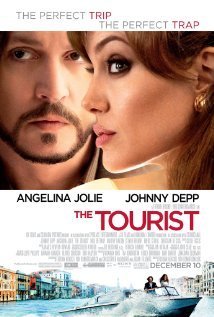 The Tourist tells the story of Frank, an American tourist visiting Italy, who meets a beautiful woman and believes it is his lucky day. Except that she deliberately chose him to save the man she loves. And all is not as it seems. The Tourist is definitely not the most amazing movie of all times, but there is enough action and twists to spend two enjoyable hours. You won't get bored. And there are stunning views of Venice which make you feel like going back there soon. The film was directed by (What a name!) and has good actors in it: (always very good) and (I just wish she hadn't blown her lips out of proportion.)
The Tourist tells the story of Frank, an American tourist visiting Italy, who meets a beautiful woman and believes it is his lucky day. Except that she deliberately chose him to save the man she loves. And all is not as it seems. The Tourist is definitely not the most amazing movie of all times, but there is enough action and twists to spend two enjoyable hours. You won't get bored. And there are stunning views of Venice which make you feel like going back there soon. The film was directed by (What a name!) and has good actors in it: (always very good) and (I just wish she hadn't blown her lips out of proportion.)









June 7, 2011
Top of the Gherkin…
I was in London last weekend for the wedding of an Australian friend of mine, and the ceremony took place…. at the top of the Gherkin! This made it an even more special event. And we were blessed with sunny weather, a bonus! The view of London from up there is truly marvelous. When I say the top of the Gherkin, I really mean the top, as you can see in the pictures below. We were right under its very tip, with nothing between us and the skies but a few glass panels. Loved it!








May 31, 2011
Pig Island, by Mo Hayder
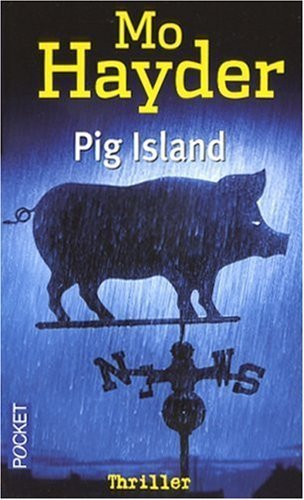 Mo Hayder at her worst! I've read several of her novels now. Some are really good, others really bad. Pig Island belongs to the latter category. What a disappointment! I won't even attempt to write a synopsis of the story, there is not enough to tell. But I will try to say why I didn't like it. Here we go: 1) The start of the book is really promising, but then it turns into nothing. In fact, very little happens in the whole book. 2) Gratuitous gore is not good writing. In the novel, thirty people get blown up by a maniac. Hayder could have used this to show her writing skills; instead, she wastes precious space in repetitive descriptions of body parts. 3) There is a twist at the end, but I saw it coming from the beginning of the book, and trust me, I'm not good at predicting twists. 4) The main character is boring, unrealistic in his obsessions, and – that's an understatement – impossible to like or care for. I could go on, but I'll stop here. Enough said. I'll give Hayder's novels a rest for a while.
Mo Hayder at her worst! I've read several of her novels now. Some are really good, others really bad. Pig Island belongs to the latter category. What a disappointment! I won't even attempt to write a synopsis of the story, there is not enough to tell. But I will try to say why I didn't like it. Here we go: 1) The start of the book is really promising, but then it turns into nothing. In fact, very little happens in the whole book. 2) Gratuitous gore is not good writing. In the novel, thirty people get blown up by a maniac. Hayder could have used this to show her writing skills; instead, she wastes precious space in repetitive descriptions of body parts. 3) There is a twist at the end, but I saw it coming from the beginning of the book, and trust me, I'm not good at predicting twists. 4) The main character is boring, unrealistic in his obsessions, and – that's an understatement – impossible to like or care for. I could go on, but I'll stop here. Enough said. I'll give Hayder's novels a rest for a while.








May 30, 2011
The Reef
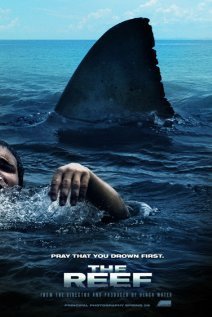 I watched The Reef on a flight back from Australia last night. The Reef is a 2010 Australian film that tells the story of a group of five friends whose sailing boat capsizes off the coast of Queensland. Because their boat is sinking, four of them decide to swim to the nearest land, a mere 15 kilometres away! There are great white sharks in the water, and they will get stalked by them. This movie, based on a true story, belongs obviously to the horror genre, but I found it quite good. It is not gory, and the story is as much about friendship and courage than about the sharks and the water. What I liked about it is that it doesn't fall into the trap of using the usual horror effects (dark filming, music and montage) to tell the story. It's not too long either (1.5 hour), which I prefer. I've had a look since at the trailer and was pretty disappointed. The trailer is everything the movie is not: voyeur, gory, silly, cheap…
I watched The Reef on a flight back from Australia last night. The Reef is a 2010 Australian film that tells the story of a group of five friends whose sailing boat capsizes off the coast of Queensland. Because their boat is sinking, four of them decide to swim to the nearest land, a mere 15 kilometres away! There are great white sharks in the water, and they will get stalked by them. This movie, based on a true story, belongs obviously to the horror genre, but I found it quite good. It is not gory, and the story is as much about friendship and courage than about the sharks and the water. What I liked about it is that it doesn't fall into the trap of using the usual horror effects (dark filming, music and montage) to tell the story. It's not too long either (1.5 hour), which I prefer. I've had a look since at the trailer and was pretty disappointed. The trailer is everything the movie is not: voyeur, gory, silly, cheap…
The film reminded me of another one in the same genre: Open Water, but I think The Reef is better.









May 28, 2011
Chinese Characters, by Han Jiantang
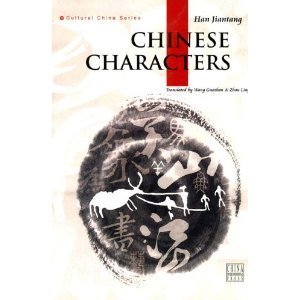 I was a little disappointed with "Chinese Characters", a book by Han Jiantang, who is Professor of Chinese at Tianjin Normal University. The book is full of information about Chinese characters, but unfortunately, it is a little hard to digest at times. The presentation and structure of the text could be improved and the English translation is not always the best. It's a shame because I was really looking forward to reading it. Having said that, if you don't mind spending a bit of time searching for what you are looking for, the book is full of interesting information.
I was a little disappointed with "Chinese Characters", a book by Han Jiantang, who is Professor of Chinese at Tianjin Normal University. The book is full of information about Chinese characters, but unfortunately, it is a little hard to digest at times. The presentation and structure of the text could be improved and the English translation is not always the best. It's a shame because I was really looking forward to reading it. Having said that, if you don't mind spending a bit of time searching for what you are looking for, the book is full of interesting information.








May 27, 2011
The Girl in the Picture, by Denise Chong
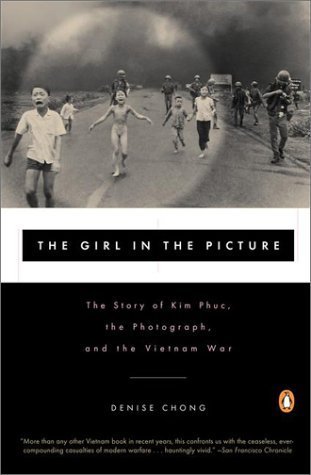 The Girl in the Picture tells the true story of Kim Phuc, the nine year old Vietnamese girl who runs naked on a road after a Napalm attack on her village during the Vietnam War. This photo, taken by Nick Ut, is probably the most famous photo of the Vietnam War, one that had a great influence in making the public aware of the atrocities of the war, and in helping – in some way - to end it. This is a fascinating story, very sad at times, scary, depressing but also full of hope. Denise Chong has done a lot of research and she starts her book with a detailed story of the life of Kim's family before the event. This in itself is very interesting and you learn a lot about the way of life of Vietnamese people in the country. Kim's life will be changed by the attack forever: she will suffer from deep burns all over her body but will miraculously recover; she will be used against her will by the Vietnamese Government as propaganda material; she will travel a lot, ending up studying in Cuba for several years before taking refuge in Canada where she currently resides; she now works as ambassador for peace at UNESCO. You will be touched by her story, but also by the plight of the Vietnamese people. Chong does a good job with detailed descriptions, clear explanations, and well-researched facts, making this book a very interesting read.
The Girl in the Picture tells the true story of Kim Phuc, the nine year old Vietnamese girl who runs naked on a road after a Napalm attack on her village during the Vietnam War. This photo, taken by Nick Ut, is probably the most famous photo of the Vietnam War, one that had a great influence in making the public aware of the atrocities of the war, and in helping – in some way - to end it. This is a fascinating story, very sad at times, scary, depressing but also full of hope. Denise Chong has done a lot of research and she starts her book with a detailed story of the life of Kim's family before the event. This in itself is very interesting and you learn a lot about the way of life of Vietnamese people in the country. Kim's life will be changed by the attack forever: she will suffer from deep burns all over her body but will miraculously recover; she will be used against her will by the Vietnamese Government as propaganda material; she will travel a lot, ending up studying in Cuba for several years before taking refuge in Canada where she currently resides; she now works as ambassador for peace at UNESCO. You will be touched by her story, but also by the plight of the Vietnamese people. Chong does a good job with detailed descriptions, clear explanations, and well-researched facts, making this book a very interesting read.








Jerome Parisse's Blog
- Jerome Parisse's profile
- 25 followers








